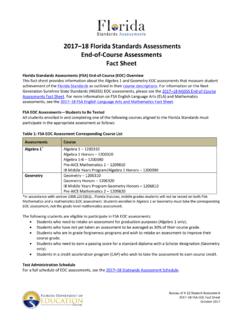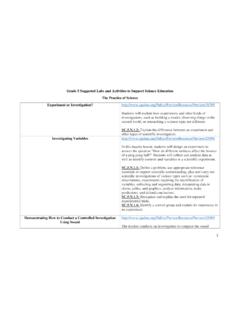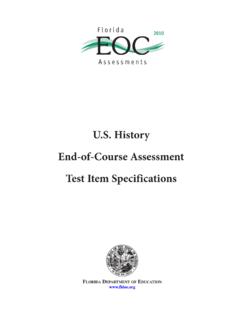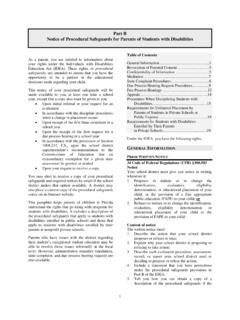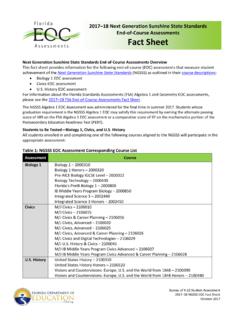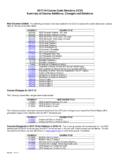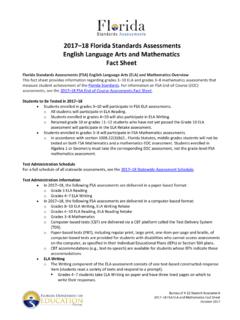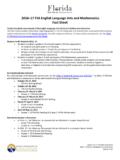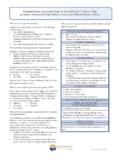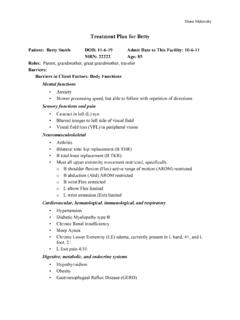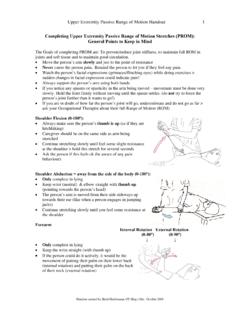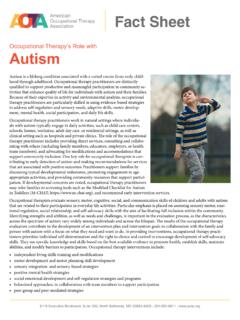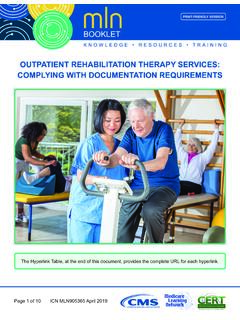Transcription of Assessments of Functional Skills: Occupational Therapy and ...
1 Assessments of Functional Skills Occupational Therapy and Physical Therapy Bureau of Exceptional Education and Student Services Florida Department of Education 2012 This publication was produced through the Bureau of Exceptional Education and Student Services (BEESS), Division of Public Schools, Florida Department of Education, and is available online at For information on available resources, contact the BEESS Resource and Information Center (BRIC). BRIC website: Bureau website: http://www. Telephone: (850) 245-0475 Fax: (850) 245-0987 Email: Copyright State of Florida Department of State 2012 Authorization for reproduction is hereby granted to the state system of public education consistent with , Florida Statutes. No authorization is granted for distribution or reproduction outside the state system ofpublic education without prior approval in writing.
2 Assessments of Functional Skills Occupational Therapy and Physical Therapy 2012 Table of Contents Acknowledgments .. vii Historical Perspective ..1 Criteria for The therapist s Role in Educational Settings ..2 Purpose of Assessment of Functional Skills in the Educational Instructions 5 Section I. Learning Environment ..6 Section II. Personal Care ..7 Section III. Mobility ..8 Section IV. Gross Motor ..10 Section V. Fine Motor/Visual Motor ..10 Section VI. Sensory Processing ..13 Assessment of Functional Skills in the Educational Handwriting Assessment ..31 Transportation Assessment ..35 Wheelchair Assessment ..45 Appendix A: Teacher/School Environment Checklists ..65 ..71 Appendix B: Home Environment Information Form Appendix C: Developmental Skills Guides ..77 iii.
3 Preface This assessment guide is designed to provide Occupational therapists and physical therapists with recommendations and suggestions for the development and assessment of skills in the educational environment. This guide is to be used by Occupational therapists and physical therapists, in conjunction with the student s individual educational plan (IEP) team. In Occupational Therapy and physical Therapy literature, the terms evaluation and assessment are sometimes used interchangeably. Typically, evaluation refers to the process of gathering information about the student s educational performance, and assessment refers to the specific tools or methods used to gather the data about the student. For the sake of consistency in this document, the term Occupational Therapy assessment or physical Therapy assessment will be used as defined by state licensure laws and will apply to both the process of gathering information and the specific tools or methods used to gather information: The Florida Practice Act for Occupational Therapy (Part III, Chapter 468, Florida Statutes) defines the term Occupational Therapy assessment as the use of skilled observation or the administration and interpretation of standardized or nonstandardized tests and measurements to identify areas for Occupational Therapy services.
4 The Florida Practice Act for Physical Therapy (Chapter 486, Florida Statutes) defines the term physical Therapy assessment as the observational, verbal, or manual determinations of the function of the musculoskeletal or neuromuscular system relative to physical Therapy , including, but not limited to, range of motion of a joint, motor power, postural attitudes, biomechanical function, locomotion, or Functional abilities, for the purpose of making recommendations for treatment. The IEP team may use all available data to determine if the student needs Therapy services to benefit from special education, for any student who has already been identified as a student with a disability. The IEP team should make this determination based on the student s present levels of academic achievement and Functional performance, as well as annual goals , in addition to Assessments conducted by a licensed therapist .
5 V Acknowledgments Thank you to the many administrators, educators, and therapists who worked on the development of this guide. Special recognition goes to: Karleen Brunt, Occupational therapist , Broward County Mary Dean, Occupational therapist , Indian River County Judy Hoskins, Occupational therapist Pinellas County Shawn Staneff, Occupational therapist , Orange County Jean M. Zimmerman, Physical therapist , Palm Beach County vii Introduction Historical Perspective Occupational Therapy and physical Therapy are included as related services of special education under federal and state laws (Individuals with Disabilities Education Act [IDEA], 2004). The role of the Occupational therapist (OT) and physical therapist (PT) in educational settings has evolved along with educational reforms. Rather than simply pulling students out of classes for interventions that may not apply in classrooms, key professionals and families together identify, evaluate, plan, provide varied service delivery models, and reassess how students can best function in various educational settings (Jackson, 2007).
6 Services and Assessments focus on the whole student and the student s environment. The entire team involved with the student collaborates, provides input, and strives to offer interventions, which support and promote success in students educational programs and objectives. According to Shepherd (1999, p. 17), school-based therapists, parents, and other members of the educational team must focus on desired outcomes rather than service delivery models. Criteria for Eligibility Federal Criteria IDEA provides for the provision of special education for children with disabilities ages 3 through 21, including the related services of Occupational Therapy and physical Therapy . For a related service to be included on the individual educational plan (IEP), the team must determine that the student requires thatservice to benefit from special education (IDEA, 2004).
7 Hanft and Place (1996) emphasize the importantcollaborative role of Occupational and physical therapists in sharing information with the IEP team based on their knowledge and experience with specific students. When determining the need for Occupational Therapy or physical Therapy services, the IEP team must consider the student s IEP goals and objectives, the supports needed to achieve these goals , and the recommendations made by the Occupational therapistor physical therapist . McEwen (2009) emphasizes the importance of differentiating between eligibility for Therapy services and need for Therapy services. Although the student may have a disability that requires private/outside Therapy , the student may not need school-based Therapy services to benefit from special education. The IEP team determines if the expertise of a therapist is necessary for the student to attain annual IEP goals .
8 State Criteria Because OTs and PTs are provided guidance by their practice acts under the Florida Statutes ( ), the State Board of Education rule references these statutes. In addition, it outlines procedures forassessment, determination of educational need and references IEPs, educational plans (EPs) andindividualized family support plans (IFSP), and plans of treatment or care in the school setting: Provision of Occupational or Physical Therapy to Exceptional Students as a Related Service. (1) Definitions. (a) Occupational Therapy is defined to mean services provided by a licensed Occupational 1 therapist or a licensed Occupational Therapy assistant pursuant to the provisions of theOccupational Therapy Practice Act found in Part III, Chapter 468, , and sub-subparagraph (1)(dd) , (b) Physical Therapy is defined to mean services provided by a licensed physical therapist or alicensed physical therapist assistant pursuant to the provisions of the Physical Therapy Practice Act found in Chapter 486, , and sub-subparagraph (1)(dd) , (c) Related service provider is defined to mean the licensed Occupational or physical therapistresponsible for the assessment and provision of school-based Occupational or physical therapyas a related service as defined in Section (3)(b), , and subparagraph (1)(dd)3.
9 , (2) Assessments . Assessments as defined in Section or , , shall be conducted by the related service provider prior to the provision of Occupational or physical Therapy .(3) Determination of need for Occupational or physical Therapy . The individual educational plan (IEP) team in accordance with Rule , , the educational plan (EP) team in accordance with Rule , , or the individualized family support plan (IFSP) team, in accordance with Rule , , shall review Assessments conducted by the related service provider and all other relevant data to determine if Occupational or physicaltherapy services are needed to assist a student to benefit from specially designed instruction.(4) Provision of input to planning teams. The licensed therapist or licensed assistant shall provide input to assist the IEP, EP, or IFSP team when the educational need for Occupational or physical Therapy as a related service is being determined, and when an IEP, EP, or IFSP for a student who is receiving Occupational or physical Therapy as a related service is being reviewed by the IEP, EP, or IFSP team.
10 (5) Plan of treatment. Once the educational need for Occupational or physical Therapy has beendetermined in accordance with the provisions of this rule, a plan of treatment as referenced inSection or , , and the corresponding requirement found Rule , , shall be developed. The plan of treatment may be included as a part of the IEP, EP, or IFSP. Rulemaking Authority , (3), , , Law Implemented (3), , History New 11-25-80, Amended 2-4-81, Formerly , Amended 2-12-91, 9-30-96, 8-22-12. The therapist s Role in Educational Settings Occupational therapists and physical therapists work collaboratively with other members of the IEP team in the areas of screening, assessment, program planning, and designing and implementing provide strategies to facilitate participation within the school environment. Interventionsmay involve teaching and training for families and school personnel, measuring and documentingprogress, using technologies to support student success, and assisting students in accessing schoolenvironments (American Occupational Therapy Association [AOTA], 2006; American Physical Therapy Association [APTA], 2009).
